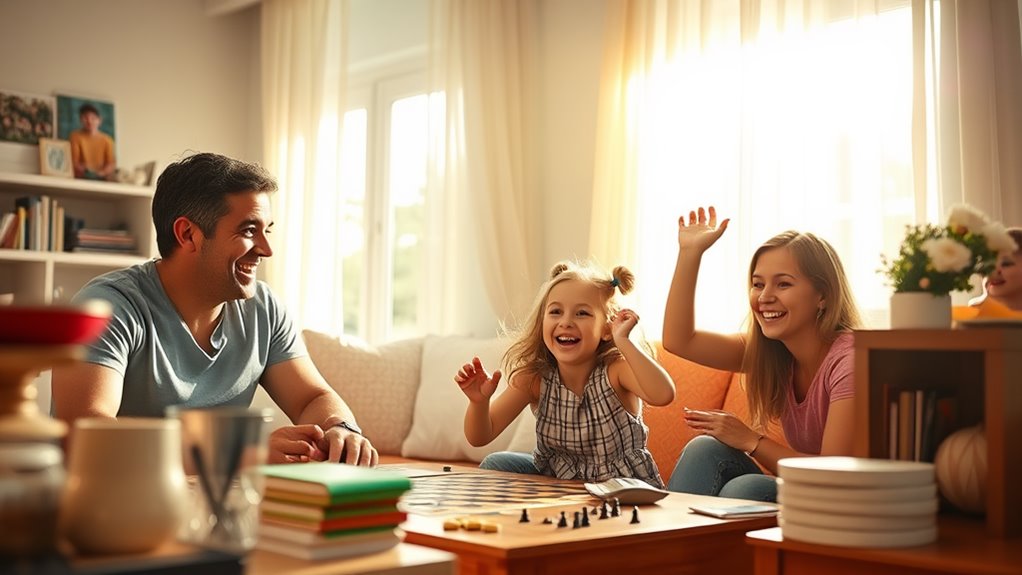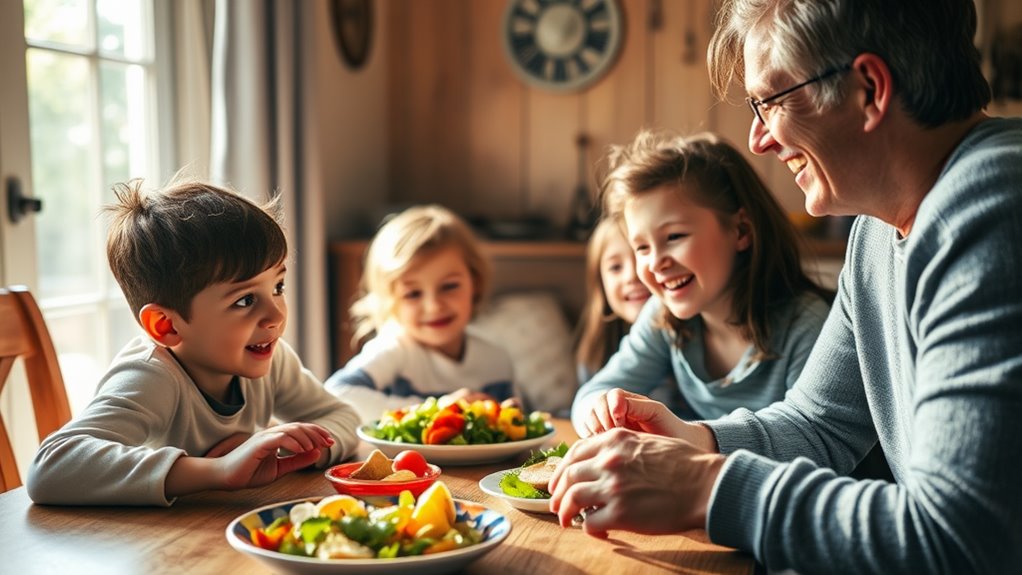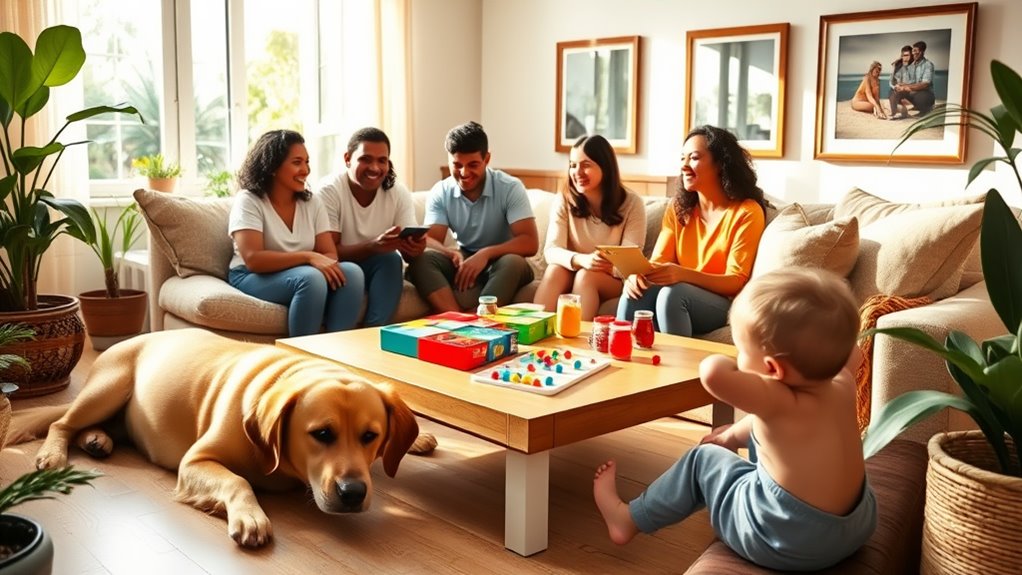How Family Dynamics Are Secretly Impacting Your Child’s Behavior!
Your child’s behavior is deeply shaped by family dynamics, often in subtle ways. The way you communicate, whether through words or nonverbal cues, creates an emotional climate they navigate daily. Different parenting styles affect their self-esteem and coping skills. Sibling relationships also play a significant role in teaching negotiation and empathy. Moreover, the presence of extended family can enrich their worldview but may also introduce stress if tensions arise. Understanding these factors can unlock the reasons behind your child’s actions, revealing the connections that matter most in their development. There’s much more to explore about this vital topic.
Key Takeaways
- Verbal interactions and nonverbal cues in family dynamics significantly shape a child’s emotional development and self-esteem.
- Parenting styles directly influence children’s behavior, with authoritative approaches fostering resilience and self-discipline.
- Sibling relationships teach crucial social skills, as rivalry and cooperation provide opportunities for negotiation and empathy.
- A positive emotional climate at home promotes emotional expression and resilience, while negativity can lead to anxiety and low self-esteem.
- Extended family interactions, particularly with grandparents, enrich children’s perspectives and reinforce social skills through shared activities and family rituals.
Communication Styles and Effects
In the heart of family life, communication styles play a crucial role in shaping child behavior and emotional development. You might not realize it, but the way you interact—through verbal interactions and nonverbal cues—significantly influences your child’s understanding of the world. When you use open, encouraging language, you’re fostering a safe emotional space where your child feels valued and understood.
Conversely, negative verbal exchanges can lead to confusion and insecurity, impacting their self-esteem and behavior. Nonverbal cues, such as your tone of voice, facial expressions, and body language, also convey messages that words alone may not express. For instance, a warm smile can reinforce affection, while crossed arms might signal disapproval or distance, causing children to misinterpret your intentions.
Parenting Approaches and Outcomes
Parenting approaches significantly shape a child’s behavior and emotional well-being. Your chosen parenting style—whether authoritative, permissive, or authoritarian—affects how your child perceives boundaries, expectations, and consequences. Each style carries distinct discipline strategies that inform your child’s understanding of right and wrong.
For instance, authoritative parenting, characterized by warmth and structure, tends to foster self-discipline and resilience. Children raised in this environment often exhibit higher self-esteem and better social skills. In contrast, authoritarian parents might enforce strict rules without much emotional support, leading to children who may struggle with anxiety or rebellion.
Permissive parenting, while nurturing, can lead to challenges with self-regulation and responsibility, as children may not learn the importance of limits. Your discipline strategies, including consistency and communication, play a crucial role in how effectively your child internalizes lessons about behavior and consequences.
Understanding these dynamics helps you adapt your approach to better suit your child’s needs. By aligning your parenting style with your child’s temperament, you can cultivate an environment that promotes positive behavior and emotional health.
Sibling Relationships and Behavior
Sibling relationships play a crucial role in shaping a child’s social development and behavior. When navigating their interactions, kids often experience sibling rivalry, which can spark competition and conflict. This rivalry, while challenging, is also a natural part of growing up. It teaches children vital skills like negotiation and conflict resolution. Understanding these dynamics can empower you to guide your children positively.
Encouraging cooperative play can counterbalance the negative effects of rivalry. When siblings engage in shared activities, they learn teamwork and empathy. You can foster this environment by providing opportunities for collaborative projects or games. Observing how they navigate these moments will give you insight into their social skills and emotional growth.
It’s essential to recognize that sibling interactions can set the stage for future relationships. The way your children manage conflicts and support each other now influences how they’ll approach friendships and partnerships later in life. By promoting healthy sibling relationships, you’re not just addressing immediate behavior; you’re laying the foundation for their social competence and emotional intelligence. Ultimately, understanding sibling dynamics can help you create a more harmonious family environment, benefiting everyone involved.
Emotional Climate at Home
Creating a positive emotional climate at home significantly influences your child’s behavior and overall development. When you foster an environment rich in emotional expression, you allow your child to navigate their feelings and build resilience. A nurturing home environment encourages open dialogues about emotions, which not only validates your child’s feelings but also teaches them how to articulate and manage their emotions effectively.
In contrast, a negative emotional climate can lead to confusion and anxiety, affecting your child’s social interactions and self-esteem. When children witness healthy emotional exchanges, they learn to mirror those behaviors. They become more skilled at resolving conflicts and empathizing with others, key traits that will serve them well throughout their lives.
You can enhance this emotional climate by modeling appropriate emotional expression yourself. Share your feelings openly and encourage your child to do the same. Make it a habit to discuss daily experiences, both good and bad, fostering an atmosphere where emotions are recognized and respected. Remember, the emotional climate at home acts as the foundation for your child’s behavior, shaping their ability to connect with others and thrive in various social settings.
Impact of Extended Family Dynamics
Extended family dynamics play a crucial role in shaping a child’s behavior and emotional well-being. Your child’s interactions with extended family members, especially grandparents, can significantly influence their development. The grandparent influence often provides a unique perspective; they may impart wisdom and values that differ from immediate family teachings, enriching your child’s worldview.
Moreover, family rituals involving extended relatives foster a sense of belonging and continuity. Whether it’s holiday gatherings or weekend visits, these traditions create a stable environment where your child feels secure. Engaging in shared activities reinforces bonds and teaches important social skills, such as empathy and cooperation.
However, not all influences are positive. If tensions exist within the extended family, your child may sense discomfort or conflict, which can translate into anxiety or behavioral issues. It’s essential to be mindful of these dynamics and guide your child through understanding and navigating relationships with extended family members.
Frequently Asked Questions
How Can I Identify My Child’s Communication Style?
To identify your child’s communication style, observe their verbal cues and nonverbal signals. Note their communication preferences, listening skills, emotional expression, conflict resolution strategies, and social interaction habits to understand their unique feedback styles.
What Role Does Birth Order Play in Behavior?
Birth order affects behavior significantly. Firstborns often display leadership traits, middle children seek attention, and youngest siblings tend to be more carefree. Understanding these dynamics helps you tailor your approach to each child’s unique needs.
How Do Family Rituals Influence Child Development?
Family rituals foster emotional bonding, creating a sense of security for your child. These traditions teach values and help develop social skills, ultimately shaping their identity and enhancing their overall emotional and psychological well-being.
Can Pets Affect Family Dynamics and Child Behavior?
Pets can significantly influence family dynamics, enhancing emotional support and fostering pet bonding. As your child interacts with pets, you’ll notice improved social skills and emotional resilience, benefiting their overall behavior and family relationships.
How Does Parental Conflict Impact Children’s Emotional Health?
How can constant parental conflict shape your child’s emotional health? It disrupts their emotional regulation and impairs conflict resolution skills, leaving them struggling with anxiety and insecurity, impacting their overall well-being and relationships.




